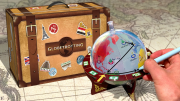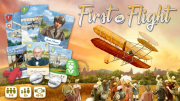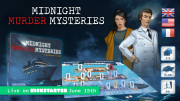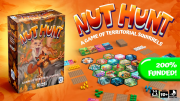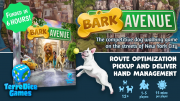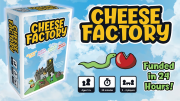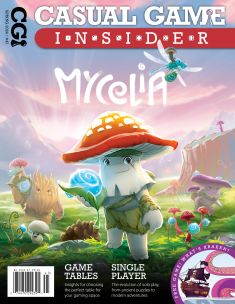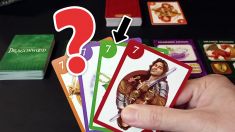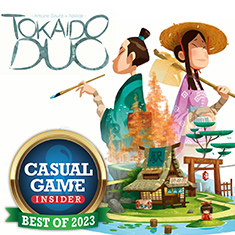Globetrotting (R2i Games) – Each player has a mini globe, which they will draw travel routes on during the game. You will be planning three trips during different seasons. Each of the three trips will start at specific locations around the globe. Each round you will reveal three new destinations, and you must choose one of them to add to one of your three trips, drawing a line to the new destination. The globe helps you to draw a straight line between locations, but also tracks how much it costs you to fly between destinations, which you jot down in your passport booklet. At the end of nine rounds, you add up how much you spent and you score two points for each player who spent more than you. You also score points for shared objectives as well as for personal objectives.
Casual Game Crowdfunding: Globetrotting, Flights, and Mystery Cruises

We’ve found a very nifty-looking game on Kickstarter, with a unique twist on flip-and-write (you’re writing on a globe!), as well as deck-builders, murder mysteries, and quirky cheeses! Additionally, for the first time we’re featuring a game on Gamefound, a platform which has continued to grow in popularity and range of games on offer.
First in Flight (Artana) – Players take turns based on where they on the board. To select an action on your turn, you move your pawn forward to an available action space. You can move as far ahead as you wish, but the farther ahead you go, the more time you're likely to have to wait until it is your next turn. Actions include upgrading, which allow you to add upgrade cards to your deck, adding friends or abilities to your garage, repairing to discard a problem card that you've revealed from your deck, and flight. When you fly you reveal cards from your deck one at a time until you choose to descend or you crash by revealing four problem symbols. Players earn points by setting flight records and going farther than their opponents.
Amygdala (Game Brewer) – On the game crowdfunding site Gamefound, this is an abstract strategy game about managing emotions inside the mind, from the designers of Azul and Paris. The main board is divided into seven different clusters, each one representing a different emotion. On your turn you may choose one of three actions. You may acquire resource tiles, moving your move marker clockwise around the edge of the main game board to purchase resource tokens you wish to buy with neuron points. If you ever pass or land on the space with the circumstance marker, you must pay one neuron point as a fee. The second possible action is to spend resource tokens to purchase emotion tiles from your player board and place these emotion tiles on the main board. You earn points based on creating connecting sets of matching emotions. You may only purchase emotion tiles that your thought marker is adjacent to on your player board, or you may spend neuron points to move your thought marker anywhere on your player board. If you clear out sets of emotion tiles on your player board you earn bonus tiles that can help with end game scoring, acquiring more neuron points, or earning claim tokens. The third action you can choose is to place one of your earned claim tokens on the board. These make you eligible for earning points by having the most emotion tokens in a cluster at the end of the game.
Midnight Murder Mysteries (Multifaces Editions) – While this is a second edition, it’s the first time this game will be released in English. It is a detective murder mystery set on a cruise ship, which you can play competitively or cooperatively. You are trying to find the killer, the motive, and how the victim died. Each case begins with a short setup in the booklet. On your turn, you have three action points to spend. You can spend a point to acquire a buoy (these can then be spent for bonus action points on future turns), move your detective to an adjacent zone on the ship, move the purser to an adjacent zone, or investigate in a zone where you are and the purser is not. You can investigate by looking for clues or talking to a witness. Each investigation action will lead you to look up a line of text in the case booklet. In a competitive game, this costs one action and you read the text out loud, or two action points and you keep the text secret. In cooperative mode, it costs two actions and you keep it secret from any detectives not in the same location as you, but you may make a single hand gesture to indicate whether the information was helpful or not. At the end of the game each player (or the team if playing cooperatively) writes down two theories for the case, and then earns points for their correct answers. If playing competitively, the player with the most points wins.
Nut Hunt! (Pine Island Games) – The game board is made up of connected hexagonal tiles. At the start of each turn you roll the die, which determines which direction the fox moves in. When the fox moves onto a tile with squirrels, all the squirrels scatter onto adjacent tiles and the active player earns two nuts (the type of nuts depends on what tile the fox moved onto). The active player then chooses up to one optional action. The active player may recruit a squirrel, hassle the fox, or scout an objective. When recruiting a squirrel, you pay the nut requirement cost on a tile in order to spawn one of your squirrels on that tile. To hassle the fox, you move the fox onto a tile that is adjacent to the fox, however you must have at least a squirrel or a nest on that tile. Any squirrels on that tile then scatter, and you forage one nut from that tile. When you scout an objective, you look at the top two cards from the objective deck and keep one. Objectives list two tile locations. In order to complete an objective, at the end of the game, you must have squirrels and/or nests on both locations, and locations forming a path between these two locations. There must be at least one nest present. You earn bonus points for the shortest connected path you have made between the two end points, and lose points for uncompleted objectives. You also earn points at the end of the game for nests. When you have three of your squirrels on a single tile together, they automatically build a nest. The game ends once a player has built four nests.
Bark Avenue (TerreDice Games) – A game all about competitive dog walking set in New York City. On your turn you will roll a die depending on your current location on the board. You will then be able to move around the board, based on the speed of the slowest dog you are currently walking. Your different dogs require different lengths of walks and will also have unique needs you will have to meet. Additionally, different events around the city will occur each round to add different challenges to navigating the board.
Cheese Factory (Jason Anarchy Games) – There are three displays in the center of the table, created from three different decks. There is the craft card display, which are typically various strange ingredients to make quirky cheeses, the recipe card display, and the machine cards display. Each player starts the game with three craft cards in hand and one machine card face-up in their factories. On your turn you take three actions. Actions can include drawing a craft card either from the display or deck, crafting one of the cheese recipes if you have the correct craft cards, buying a machine (different machines cost a different number of action points to purchase) which in turn give you different abilities, and starting a cheese fire. When you play a cheese fire card, it destroys an opponent's machine if they do not have a card to combat it.
Disclosure: unless otherwise noted, we have not seen or played any of the above games. Our assessment of each is based on the information given on the crowdfunding project page.






